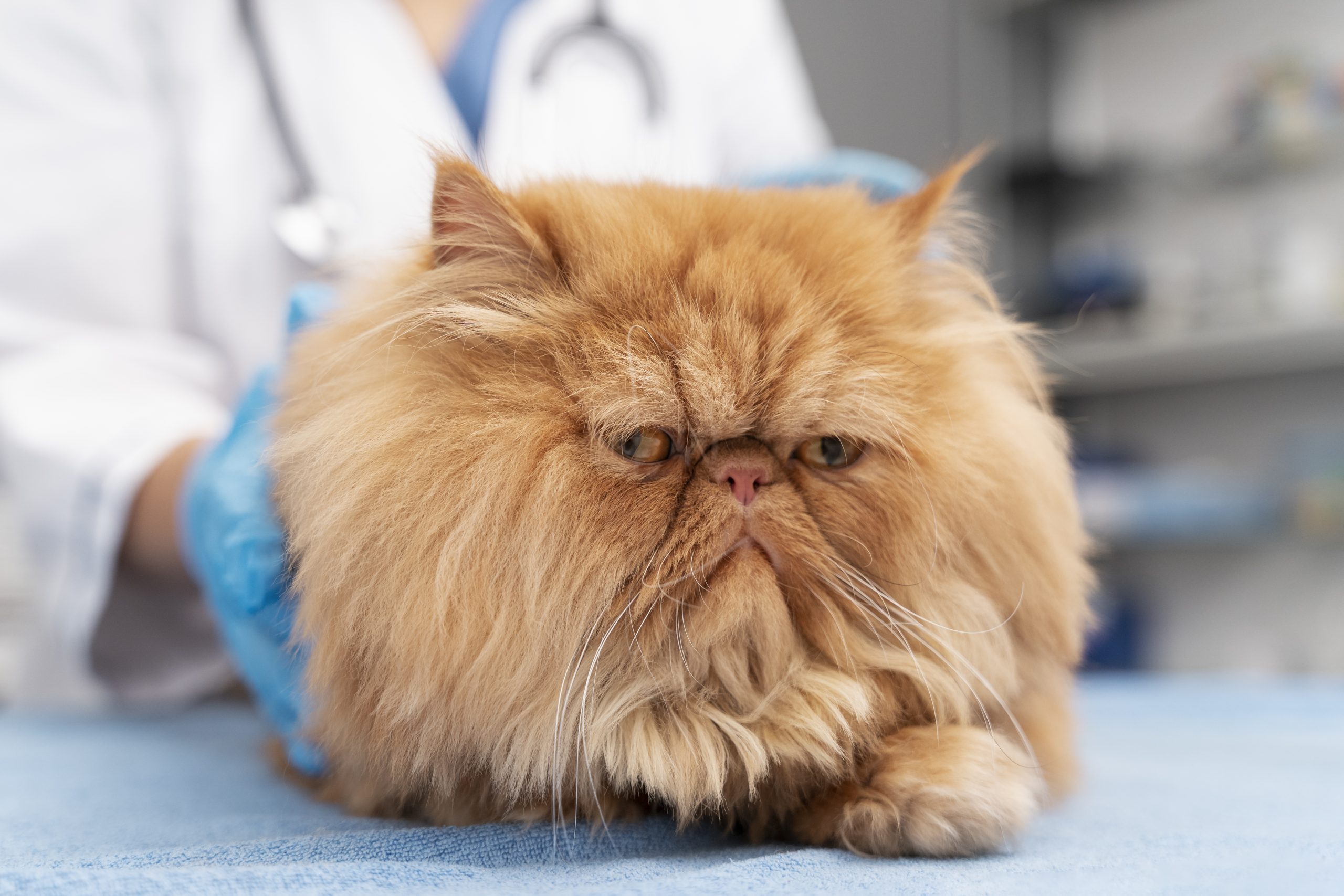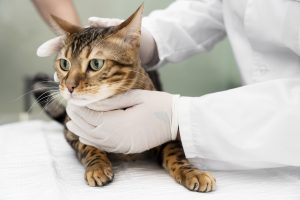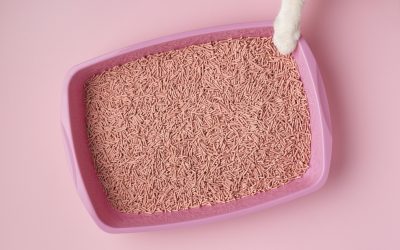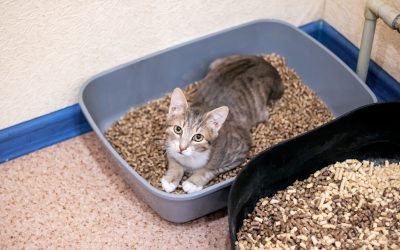Chronic Diarrhea in Cats: Causes, Diagnosis & Treatment

Updated October 13, 2025
If your cat has loose or watery stools that persist for more than three weeks, they may be dealing with chronic diarrhea, which can be stressful for both you and your cat. Unlike the occasional upset stomach that clears up on its own, chronic diarrhea often points to an underlying issue that needs attention.
Left unchecked, chronic diarrhea can lead to dehydration, nutrient deficiencies, and unwanted weight loss. That’s why it’s important to know the difference between a one-off tummy upset and a persistent problem that calls for a closer look.
Keep an eye on your cat’s litter box habits. If diarrhea becomes a recurring issue or seems to be getting worse, it’s best to consult your veterinarian. Catching the problem early can help keep your cat feeling their best and prevent more serious complications down the road.
Common Causes of Chronic Diarrhea in Cats
There’s no single cause of chronic diarrhea, and it often takes a bit of detective work to figure out what’s going on. Some potential causes include:
- Dietary changes or indiscretions: Cats have sensitive stomachs, so suddenly switching their food or letting them nibble on something they shouldn’t can upset their digestive system.
- Infections: Bacteria, viruses, and parasites like Giardia or roundworms are common culprits. These bugs can linger and keep your cat’s tummy unsettled.
Intestinal Disease
The veterinarian Stephanie Howe, DVM stated in the PetMD article:
- “Intestinal parasites (Tritrichomonas foetus, Giardia, worms, Cryptosporidium, Coccidia)
- Bacterial infections (E. Coli, Salmonella, Clostridium)
- Viral infections (feline immunodeficiency virus and feline leukemia virus)
- Food allergies
- Vitamin deficiencies
- Partial obstructions (foreign material, intussusceptions, or masses)
- Abnormal digestion of food (protein-losing enteropathy or pancreatic insufficiency)
- Triaditis
Nonintestinal Disease
- Hyperthyroidism
- Kidney disease
- Liver disease
- Diabetes
- Cancer (lymphoma, mast cell tumors, adenocarcinoma, polyps)
- Pancreatitis”
Signs to Watch For
Chronic diarrhea is more than just loose stools. Here are a few other signs that something could be wrong:
- Frequent litter box visits: If your cat is going more often than usual, it might be a sign of discomfort.
- Weight loss: If your cat’s dropping pounds without explanation, that’s a red flag.
- Lethargy: A usually playful cat who seems low on energy may not be feeling well.
What to Expect at the Vet
If your cat needs a vet visit, you might be wondering what comes next. Here’s a quick rundown to help you feel prepared:
- Medical history: Your vet will ask about your cat’s diet, daily habits, and any recent changes you’ve noticed.
- Physical exam: They’ll check for dehydration, abdominal pain, or other physical signs that can give clues.
- Diagnostic tests: Depending on what they find, your vet may suggest bloodwork, fecal exams, or imaging like X-rays or ultrasounds.
- Complete Blood Count and Blood Chemistry: These tests measure red and white blood cells, electrolytes, and how well your cat’s internal organs, like the liver and kidneys, are functioning. They’re often the first step in understanding your cat’s overall health.
- Thyroid Test: The thyroid gland plays an important role in metabolism. By checking your cat’s thyroid hormone levels, your vet can see if an overactive or underactive thyroid may be causing weight or energy changes.
- Fecal Test: This simple test looks for intestinal parasites or infectious organisms that may be upsetting your cat’s stomach or causing digestive issues.
- Urinalysis: By testing your cat’s urine, vets can spot bacteria, protein, or glucose all of which can point to infections, diabetes, or kidney problems.
- Infectious Disease Screening: Cats can be tested for conditions like feline immunodeficiency virus (FIV) and feline leukemia virus (FeLV). These diseases affect the immune system and can make cats more vulnerable to other health issues.
- Biopsies: In some cases, your vet may need to take small samples from your cat’s lower intestinal tract. This procedure is done under anesthesia and provides important information about chronic digestive problems or suspected disease.
- X-Rays: If your cat has a possible intestinal blockage, an X-ray can help your vet see if there’s a partial obstruction affecting digestion.
- Abdominal Ultrasound: This imaging test allows your vet to look more closely at the intestines, lymph nodes, liver, kidneys, and spleen. It’s a safe and effective way to check for inflammation, tumors, or other internal issues.
How Chronic Diarrhea is Treated
Once your vet figures out the underlying cause, they’ll put together a treatment plan tailored to your cat. This might include:
- Diet changes: A hypoallergenic or easily digestible diet can work wonders, especially if food sensitivities are to blame.
- Medications: Antibiotics for infections, anti-inflammatories for gut irritation, or even probiotics to support healthy digestion.
- Surgery: Rare, but in cases like tumors or blockages, surgery could be needed.
Supporting Digestive Health at Home
Diet plays a huge role in managing chronic diarrhea. Here are some gentle steps you can take:
- Make changes slowly: Always introduce new foods over several days to give your cat’s stomach time to adjust.
- Choose quality food: Look for diets that are easy on sensitive stomachs and free from common allergens like wheat or corn.
- Keep your cat hydrated: Fresh water is essential, and adding some wet food can help boost moisture intake.
Simple Home Helpers and Prevention Tips
Alongside vet care, a few home strategies can make a big difference:
- Plain canned pumpkin (not pie filling): A spoonful now and then may help firm up stools thanks to its fiber content.
- Probiotics: Good bacteria can support a healthy gut. Ask your vet which feline-friendly products to try.
- Reduce stress: Keep your cat’s routine steady and their environment calm. If your cat gets anxious easily, consider pheromone diffusers.
Can Odie Pet Insurance Provide Coverage for the Treatment of Your Cat?
Depending on the specific policy, pet insurance can cover the diagnosis, treatment, and management of diseases in cats.
Reimbursement
This method is the most common for pet insurance companies. You pay out of pocket for the veterinarian bill, and then the insurance company reimburses you for what’s covered under the insurance plan. The steps look like this.
- You pay the vet bill after your cat’s visit.
- You fill out the pet insurance claim form.
- Submit the claim form and other required documentation to the insurer.
- After the claim is approved, you will be reimbursed for eligible expenses.
Odie’s Illness and Injury pet health insurance plan offers comprehensive coverage for your cat.
What Does Odie Pet Insurance Cover?
Pet insurance covers various veterinary expenses, providing financial protection and peace of mind for pet owners. Here are the details of the coverage options offered by Odie Pet Insurance:
Illness & Injury Plan
The Illness & Injury Plan is an all-inclusive insurance plan designed to cover a wide range of medical needs for your pet. This plan includes comprehensive coverage for various illnesses, injuries, and veterinary services. Some of the covered items include:
- Veterinary exams and consultations
- Diagnostics (e.g., X-rays, lab tests)
- Prescribed medications
- Surgeries and hospitalization
- Rehabilitation, acupuncture, or chiropractic treatments
- Medically necessary supplies
- Euthanasia and cremation
The Wellness Plan
The Wellness Plan is a monthly membership that focuses on preventive care and covers routine veterinary services.
- Provides reimbursements for routine care items such as wellness visits (exams and vaccines), testing and parasite prevention, dental cleanings and at-home dental care, vitamins, supplements, and more.
- Through Odie’s partnership with Petivity, a leader in smart pet products and proactive care, Wellness Plan members can also receive reimbursements for Petivity devices and health kits, as well as eligible Purina food and supplements.
- Total reimbursement up to $700 per year.
FAQs
Why are chicken bones dangerous, and should I be worried?
Cooked chicken bones become brittle and splinter easily, which can cause choking, cuts, digestive injuries, internal bleeding, or blockages. While most dogs pass bones without incident due to strong stomach acid, the risk is serious enough to always contact your vet. Cooked bones are more dangerous than raw bones, and puppies are at higher risk.
What should I do immediately if my dog ate a chicken bone?
Stay calm and check for choking (gasping, pawing at mouth, difficulty breathing). Call your vet immediately for guidance. DO NOT induce vomiting, give laxatives/antacids, or make sudden movements. You can try removing the bone calmly if it is not fully swallowed, but never force it.
What symptoms indicate a serious problem?
Contact your vet immediately for vomiting, loss of appetite, lethargy, bloody/black stool, constipation, abdominal pain/bloating, diarrhea, difficulty breathing, excessive drooling, reluctance to move, constant swallowing, or fever. Monitor your dog for 24-72 hours and check the stool for bone fragments.
How should I care for my dog after they eat a chicken bone?
Consult your vet first, then consider giving small pieces of white bread to cushion bone fragments. Feed a bland diet (canned food, boneless boiled chicken, rice, green beans) for a few days. Avoid kibble temporarily. Don’t give over-the-counter medications without vet approval.
What veterinary treatment might be needed?
Your vet will perform a physical exam, possibly X-rays, and lab work. Treatment may include monitoring, IV fluids, hospitalization, endoscopy to retrieve bones, surgery for blockages/perforations, bland diet, antibiotics for infection, or pain management. Surgery is necessary for obstructions or perforations.
How can I prevent this, and does pet insurance cover it?
Keep food out of reach, use secure trash cans, train your pet to “leave it/drop it” commands, supervise meals, and dispose of bones immediately. Odie’s Illness & Injury Plan covers diagnostic tests, medications, surgeries, hospitalizations, and emergency care for incidents involving chicken bones.




